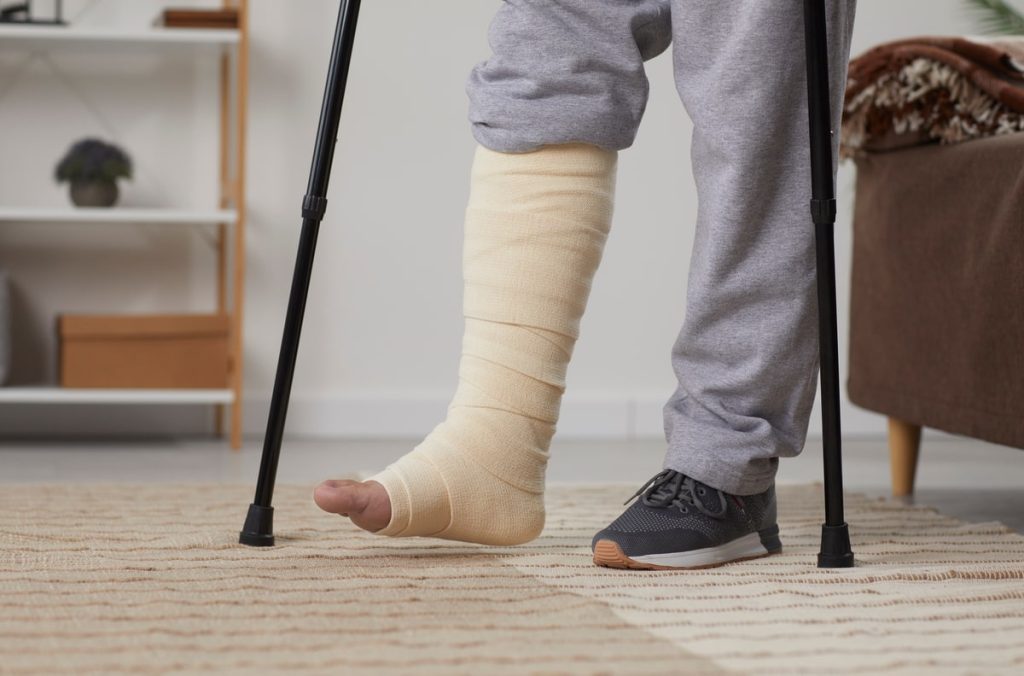Recovery from foot surgery is a journey that requires patience, discipline, and heedfulness. The healing process involves resting, steadily increasing activity, taking medications as prescribed, and other necessary measures. However, alongside these positive steps towards recovery, there are some habits you must avoid.
Foot surgery spans from minor procedures to resolve discomfort to complex operations necessitated by serious conditions like fractures, deformities, or arthritis. The foot surgery recovery period, typically extending over weeks after your surgery, is driven by two main elements – the body’s natural healing process and your commitment to giving it the necessary support.
Here we discuss three common habits you must avoid during the recovery period to ensure a speedy and smooth healing process.
 1. Overexertion — Pushing Yourself Beyond The Advised Recovery Time After Foot Surgery
1. Overexertion — Pushing Yourself Beyond The Advised Recovery Time After Foot Surgery
Recovery after foot or ankle surgery requires patience and adherence to your doctor’s instructions. Rushing this process can result in setbacks; even minor actions can impact your recovery. The recovery period after foot and ankle surgeries varies widely depending on the type of surgery. Simple procedures may require several weeks for healing, while more complex surgeries can take up to a year to recover fully.
Pain is your body’s way of informing you that something is wrong. If you experience pain while performing a particular activity or movement, it’s a sign that you should stop doing it. Trying to “power through” pain can lead to further injury or strain, ultimately prolonging your recovery.
A. The Dangers Of Rushing Your Recovery
Pushing yourself to return to your previous activity levels immediately after surgery can lead to complications. Putting weight on your foot too soon, standing for long periods, or forgoing your post-surgical shoes increases pain, swelling, and risks of surgery-related problems around the incision site.
Always heed your doctor’s advice during the first few days and weeks after surgery to maximize your recovery.
Each step of the recovery process, including non-surgical treatments and physiotherapy, is crucial to restore function and avoid chronic pain. Your foot and ankle conditions may last days after your surgery, and it’s essential that you maintain a patient attitude.
B. Managing Your Expectations During Recovery
Recovery from foot and ankle procedures is not linear and unique to everyone. It may take longer than expected, and some discomfort may linger. The first two weeks are crucial for maintaining the bandage, keeping your foot elevated above the level of your heart, and managing pain and swelling with medications. However, keep a heads-up that some medications can cause constipation. Increasing your intake of foods high in fiber aids in maintaining healthy bowel movements.
Here are some tips to help in the management of your recovery after foot and ankle surgery:
- Follow-up Appointments: Regular check-ups with your foot and ankle surgeons allow you to monitor healing, detect any signs of infection, and adjust your treatment plans if necessary.
- Orthopedic Care: This plays an essential role in post-surgery recovery. Depending on the type of surgery, you may need assistive devices for extra stability or engage in a form of rehabilitation.
- Support System: Ensure you at least have someone drive you home after surgery and eliminate navigation hazards at home. Placement of non-skid mats and grab bars offers extra support.
- Non-surgical Methods: Keep your leg elevated, and remember it’s best to keep the operated foot clean and dry to minimize risks.
2. Neglecting Orthopedic Care During Post-Surgical Recovery
During post-surgical recovery, orthopedic care is vital in maintaining your foot and ankle health. Ignoring it can lead to complications, a longer recovery, and persisting foot pain. After surgery, post-operative orthopedic care guides the healing process and regains optimal foot and ankle function. It involves monitoring your progress, ensuring appropriate footwear, and prescribing assistive devices as needed to promote a smooth recovery.
The Risks Of Ignoring Post-Surgical Orthopedic Care
Ignoring your orthopedic care plan can hinder your healing process and cause complications, such as infections or prolonged foot pain. Following surgery, it’s essential to attend all appointments and follow your orthopedic specialist’s advice to prevent setbacks in recovery. During recovery, your orthopedic specialist will utilize non-surgical methods to manage your foot or ankle pain and promote optimal healing.
Such methods may include:
- Elevation
- Icing
- Compression
- Immobilization to reduce swelling
- Pain medication to minimize discomfort.
Notably, it’s essential to keep an open dialogue with your physician, as certain pain medications may cause constipation in some patients.
Various Ways To Adhere To Your Orthopedic Care Plan
To stay on track with your orthopedic care plan, adhere to your specialist’s recommendations for the weeks after your surgery.
- Wear appropriate footwear, use an assistive device as prescribed, and follow your doctor’s guidance throughout recovery.
- Incessantly check your surgical wound to ensure it’s clean and dry. Your doctor will give you instructions on cleaning and dressing your wound and when to change the dressing. Neglecting proper wound care can lead to infection or interfere with proper healing.
- Post-surgery, protect your foot by wearing the appropriate footwear, such as surgical shoes, compression socks, or braces.
- Wearing unsuitable shoes can add pressure and strain to the affected area, further delaying recovery.
 3. Ignoring Joint Replacement Recommendations For Foot And Ankle Care Post-Surgery
3. Ignoring Joint Replacement Recommendations For Foot And Ankle Care Post-Surgery
Foot surgery recovery is often involved and may include joint replacement advice from our orthopedic expert. Dismissing such recommendations can create roadblocks on your path to healing. Joint replacement is a surgical procedure that replaces damaged parts of a joint with artificial parts. It’s often suggested when other treatments fail to relieve foot pain or improve function, making it a vital part of many recovery plans following surgery. Following foot surgery, your orthopedic specialist may recommend a joint replacement if it aligns with your healing process. This suggestion could stem from extensive joint damage, prolonged foot pain, or decreased function weeks after surgery.
Joint replacement works as a catalyst in the post-operative healing process. It reduces pain, improves mobility, and enhances the quality of life. An orthopedic specialist may prescribe specific footwear or an assistive device to support your new joint and maximize its potential during the recovery time.
Ignoring joint replacement advice can lead to various complications, including persistent foot pain, decreased mobility, and possible need for further surgery. Remember, each piece of advice from your orthopedic expert plays a crucial role in shaping your post-surgical recovery journey. Your commitment is essential regardless of your recovery period, whether weeks or months. Stick to your recovery plan, ensure you wear the recommended footwear, use the assistive device as advised, and keep yourself as active as feasible.
The Key To Safe And Successful Recovery From Foot Surgery
Maintaining proper care throughout your Foot Surgery Recovery process is vital. Keep your foot elevated and adhere to bandage and incision care instructions to minimize pain and swelling during your Foot Surgery Recovery. Follow your doctor’s orders for weight-bearing restrictions or use of assistive devices during Foot Surgery Recovery to mitigate the risks of surgery.
Recovery from foot surgery requires a commitment to appropriate aftercare, including resting adequately, taking prescribed medicines correctly, attending all follow-up appointments, and wearing suitable footwear.
Avoid the tempting, yet harmful habits mentioned above to steer your recovery journey in the right direction. In due time, with care and caution, you will win your mobility back.
COMMITTED
TO EXCELLENT SERVICE
Our philosophy has been that the patient always comes first.
EMERGENCY OPERATOR
24 HOURS
Get emergency care from a specialist right from the start. Don’t go to an urgent care, ER or general doctor. Come straight the specialist.



